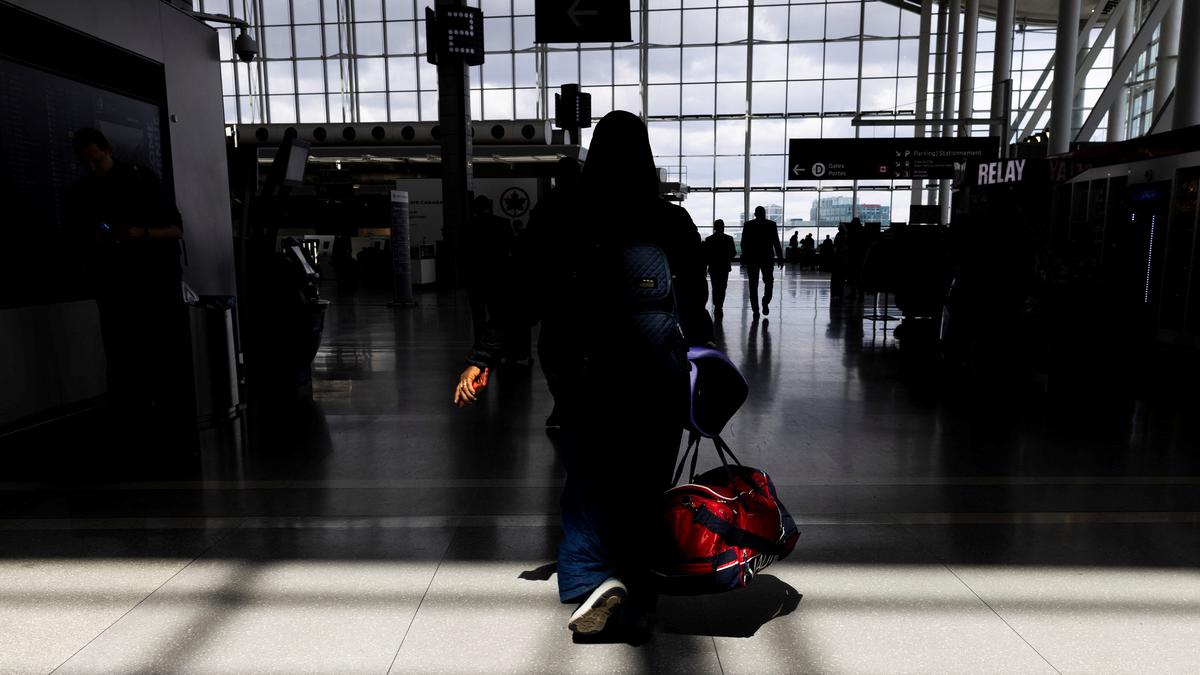Canada should better track foreign student departures: criminologist. This isn’t just about paperwork; it’s about safety, security, and Canada’s international reputation. Currently, tracking methods are a patchwork, leaving gaps that could be exploited. This article explores the criminological aspects of inadequate tracking, the economic implications of improvement, and the practical steps needed to create a more robust system while protecting student privacy.
We’ll examine how improved tracking could prevent crime, boost Canada’s standing as a trusted destination for international students, and enhance the overall student experience. We’ll also weigh the costs and benefits of upgrading the system, considering technological solutions and the vital role educational institutions play in this process. Get ready to dive into a crucial discussion about balancing security and student well-being.
Current State of Foreign Student Tracking in Canada
Canada’s system for tracking foreign student departures is currently a patchwork of methods, lacking a centralized, comprehensive approach. This necessitates a review of existing practices and a comparison with international best practices to identify areas for improvement.
Existing Methods for Tracking Foreign Student Departures
Currently, Canada relies on a combination of methods to track foreign student departures. These include the reporting obligations of Designated Learning Institutions (DLIs), data collected by Immigration, Refugees and Citizenship Canada (IRCC), and information gathered from airlines and border services. However, the efficiency and effectiveness of data sharing between these various entities remains a significant challenge.
Comparison with Other Countries
Countries like Australia and the United Kingdom have implemented more robust tracking systems, often leveraging technology to improve data accuracy and timeliness. These systems often involve digital check-in/check-out processes, integration with national databases, and more sophisticated data analytics capabilities. While Canada’s system is not entirely lacking, it is less centralized and integrated compared to these examples.
Weaknesses and Gaps in the Current Tracking System
Several weaknesses exist within Canada’s current system. Data inconsistencies across different reporting sources, limited real-time tracking capabilities, and challenges in data sharing between government agencies and DLIs are key concerns. The lack of a standardized departure reporting mechanism also contributes to inefficiencies and potential gaps in information.
Strengths and Weaknesses of Foreign Student Departure Tracking Systems
| Country | Method | Strengths | Weaknesses |
|---|---|---|---|
| Canada | DLIs reporting, IRCC data, airline/border data | Relatively simple to implement initially; leverages existing infrastructure. | Data inconsistencies; lack of centralized database; limited real-time tracking; inefficient data sharing. |
| Australia | Integrated digital system, biometric data | Real-time tracking; accurate data; improved data analysis capabilities; better fraud detection. | Higher initial implementation costs; potential privacy concerns. |
| United Kingdom | Centralized database, linked to visa and immigration systems | Efficient data sharing; improved oversight; streamlined processes. | Requires significant investment in technology and infrastructure; potential for system vulnerabilities. |
The Criminological Perspective on Foreign Student Departures
Inadequate tracking of foreign student departures creates vulnerabilities that can be exploited for criminal activities. Improved tracking mechanisms can significantly enhance crime prevention and investigation efforts.
Links Between Inadequate Tracking and Criminal Activity
The lack of a robust tracking system can facilitate various crimes. For instance, individuals overstaying their visas, engaging in human trafficking, or committing other offences might go undetected if their departure isn’t properly monitored. This lack of oversight creates an environment conducive to criminal activity.
Improved Tracking and Crime Prevention
A more effective tracking system would allow authorities to identify individuals who have overstayed their visas or are suspected of criminal activity. Real-time tracking capabilities could enable quicker interventions, preventing potential crimes and facilitating faster investigations. This also helps in identifying patterns and trends related to crime involving foreign students.
Ethical Considerations
Enhanced tracking raises ethical concerns regarding privacy and potential discrimination. It is crucial to balance the need for security with the protection of individual rights. Transparency, data security, and adherence to privacy regulations are paramount in designing and implementing any improved tracking system.
Examples of Scenarios Where Better Tracking Could Have Prevented or Solved Crimes
Consider a scenario where a foreign student is suspected of involvement in a fraud scheme. With a robust tracking system, authorities could quickly verify the student’s departure status and, if necessary, initiate an investigation more effectively. Another example could be a case of human trafficking, where timely tracking of student departures could help identify victims and disrupt criminal networks.
Economic Impacts of Improved Tracking
Investing in a more robust tracking system offers significant economic benefits, both directly and indirectly, impacting Canada’s educational sector and its international reputation.
Potential Economic Benefits

A more efficient system would reduce administrative costs associated with managing student visas and departures. It would also improve the accuracy of student enrollment data, leading to better resource allocation within educational institutions. Furthermore, enhanced security measures can attract more international students, boosting the economy.
Impact on the Reputation of Canadian Educational Institutions
A reputation for strong security and effective management of international students is crucial for attracting high-quality applicants. A robust tracking system demonstrates Canada’s commitment to responsible and secure education, enhancing the global standing of Canadian institutions.
Arguments For and Against Financial Investment
While there are initial costs associated with implementing a new system, the long-term economic benefits, including increased student enrollment, improved resource allocation, and a stronger international reputation, outweigh the investment. However, opponents might argue that the current system is adequate or that the cost of implementation is too high.
Potential Economic Gains from Better Tracking

- Reduced administrative costs
- Improved resource allocation within educational institutions
- Increased international student enrollment
- Enhanced reputation of Canadian educational institutions
- Reduced costs associated with investigating crimes involving foreign students
Practical Solutions for Improved Tracking
Several practical steps can be taken to enhance the tracking of foreign student departures. These include leveraging technology, improving data sharing mechanisms, and strengthening collaboration between various stakeholders.
Specific Actionable Steps
This involves creating a centralized database accessible to all relevant agencies, implementing a standardized departure reporting system, and investing in real-time tracking technologies. Strengthening collaboration between DLIs, IRCC, and border services is crucial for seamless data flow.
Improved Tracking Process Flowchart
A flowchart would depict the improved process: Student completes studies; DLI electronically submits departure information to a central database; Information is automatically shared with IRCC and border services; Real-time monitoring flags potential discrepancies; Authorities can initiate investigations as needed. (Note: A visual flowchart would be included here in a full article.)
Technological Solutions
Biometric data, digital check-in/check-out systems, and integration with existing national databases are examples of technological solutions that can significantly enhance the accuracy and efficiency of tracking. Each solution presents its own set of advantages and challenges regarding cost, implementation, and data security.
Challenges in Implementing Solutions
Challenges include integrating various existing systems, ensuring data security and privacy, obtaining necessary funding, and addressing potential resistance from stakeholders. Careful planning and phased implementation are essential to minimize disruption and maximize effectiveness.
Impact on International Student Experience
Enhanced tracking measures could potentially impact the international student experience. It is crucial to mitigate any negative impacts and ensure the process remains student-centric, prioritizing their well-being while maintaining security.
Potential Impact on Student Experience
Students might perceive enhanced tracking as intrusive or overly bureaucratic. Concerns about data privacy and potential misuse of information are valid and must be addressed proactively.
Okay, so we’re talking about Canada needing better tracking of foreign student departures – a criminologist’s suggestion. It’s a serious issue, but let’s take a quick break to check out something completely different: Syracuse football 2025 schedule: Who does SU face next season? Now, back to the important stuff: improving oversight of foreign student movements in Canada is key for various reasons, including national security and accurate student data.
Mitigating Negative Impacts
Transparency and clear communication are key. Students should be informed about the purpose of tracking measures, how their data will be used, and the safeguards in place to protect their privacy. Regular feedback mechanisms can help address concerns and improve the system.
Privacy and Data Security Concerns
Robust data security measures are crucial to prevent data breaches and misuse. Compliance with privacy regulations is non-negotiable. The system should be designed with built-in safeguards to protect student data and maintain confidentiality.
Ideal Balance Between Security and Student Well-being
The ideal balance lies in creating a system that effectively addresses security concerns while minimizing any negative impact on the student experience. This requires a transparent, efficient, and secure system that respects student privacy and fosters trust. Clear communication, robust data protection measures, and regular feedback mechanisms are crucial in achieving this balance.
The Role of Educational Institutions

Canadian educational institutions play a vital role in ensuring the effective tracking of foreign student departures. Collaboration between institutions and government agencies is essential for a successful system.
Responsibilities of Educational Institutions
DLIs have a responsibility to accurately report student enrollment and departure information. They should invest in internal systems that streamline data collection and reporting, ensuring accuracy and timeliness.
Collaboration Between Institutions and Government Agencies

Effective collaboration involves seamless data sharing between DLIs and IRCC. This requires standardized reporting formats, secure data transmission methods, and clear communication protocols. Regular meetings and collaborative projects can enhance communication and coordination.
Best Practices for Institutions, Canada should better track foreign student departures: criminologist
Institutions should implement secure, reliable internal tracking systems, provide regular training to staff on data management and reporting procedures, and establish clear communication channels with students regarding data privacy and security. Regular audits of their systems can help maintain data integrity and identify areas for improvement.
Okay, so we’re talking about Canada needing better tracking of foreign student departures – a criminologist’s suggestion, right? It’s a complex issue, and sometimes it’s good to take a break from serious news. Check out this article, Margaret Qualley reveals the reason why shooting The Substance , for a lighter read. Then, back to the important stuff: improved tracking of student departures is crucial for accurate data and ensuring program integrity.
Hypothetical Scenario of Effective Collaboration
Imagine a scenario where a DLI notices a student’s prolonged absence. Using the improved tracking system, the institution flags this to IRCC. IRCC, in turn, can investigate and take appropriate action, preventing potential problems. This coordinated response demonstrates the effectiveness of collaboration in ensuring student safety and compliance.
Okay, so a criminologist thinks Canada needs better tracking of foreign student departures – it’s a serious issue about accountability and ensuring the system’s integrity. This reminds me of how eagerly anticipated the next season of a show is, like, you know, Squid Game Will Return and Conclude With an Epic Season 10 , and that level of anticipation should also apply to following up on student visas.
Ultimately, stronger tracking will help Canada manage its immigration policies more effectively.
Conclusive Thoughts
Ultimately, enhancing the tracking of foreign student departures in Canada is a multifaceted issue requiring collaboration between government agencies, educational institutions, and students themselves. A well-designed system, incorporating technological advancements and ethical considerations, can significantly improve safety and security while maintaining a welcoming environment for international students. The economic benefits, enhanced reputation, and improved student experience all point towards a significant need for change.
Let’s work together to create a system that’s both effective and respectful.
FAQ Guide: Canada Should Better Track Foreign Student Departures: Criminologist
What specific types of crimes are linked to inadequate tracking?
Inadequate tracking can facilitate human trafficking, identity theft, and other crimes involving exploitation of vulnerable individuals.
How will improved tracking impact student visa processing times?
The impact on visa processing times depends on the implementation. A well-designed system could streamline the process, but poor implementation could lead to delays.
What are the potential privacy concerns surrounding biometric data?
The use of biometric data raises concerns about data breaches and potential misuse. Strong security protocols and clear data governance are essential.
What role do international student organizations play in this?
Student organizations can advocate for improved tracking systems that protect student rights and well-being while contributing to a safer environment.
